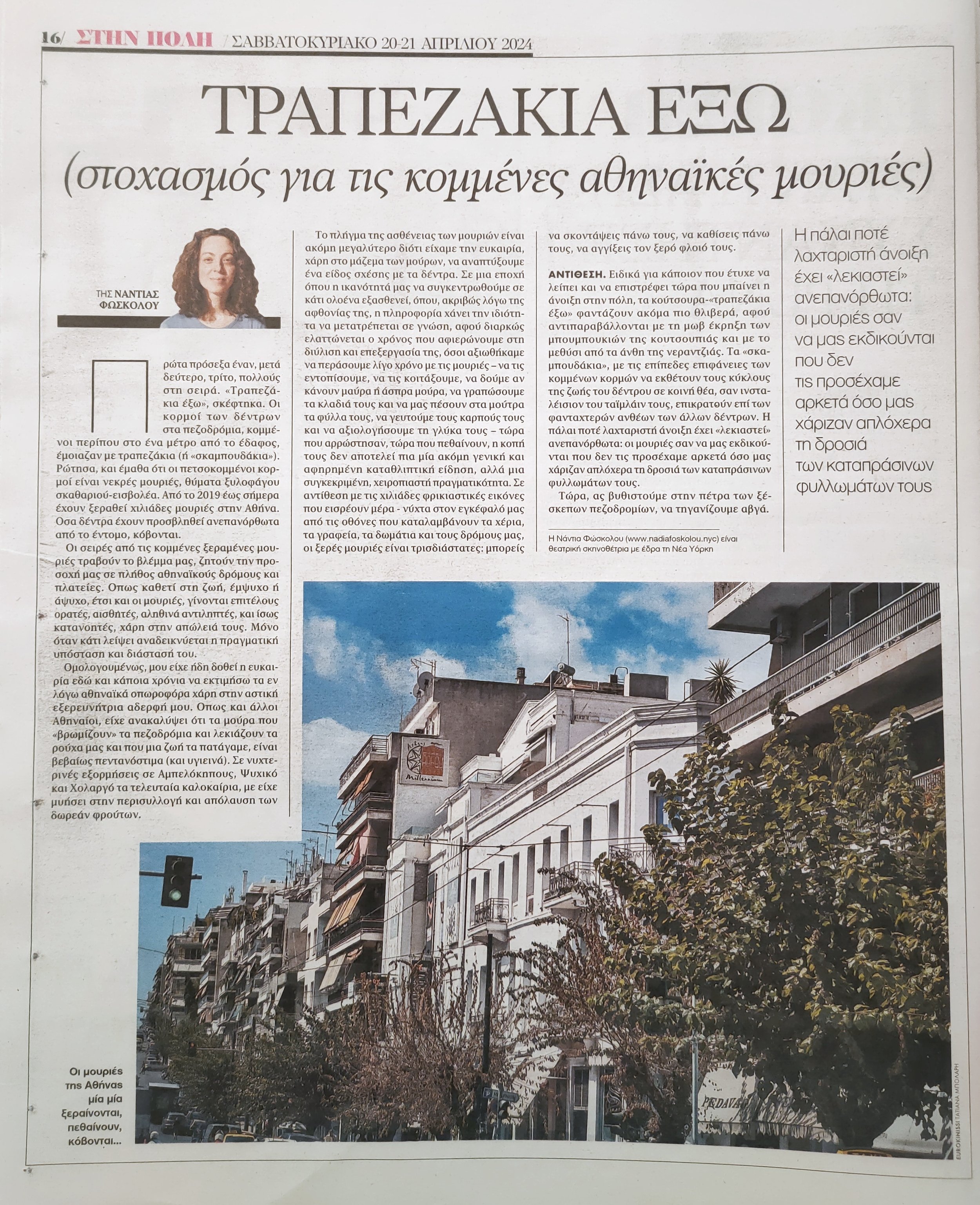(reflection on the cut-down Athenian mulberry trees)
First I noticed one, then a second, a third one, many in a row. “Little tables as in cafés' and restaurants' outdoor seating areas, like the title of the album by Greek composer Dionysis Savvopoulos (Τραπεζάκια Έξω)”, I thought to myself. The sidewalk tree trunks, cut at about one meter from the ground, seemed like little tables (or stools). I asked, and I found out that the chopped up trunks are dead mulberry trees, victims of a wood-boring invasive beetle. Between 2019 and today, thousands of mulberry trees have withered in Athens. Trees irrepairably infected by the insect are getting cut down.
The rows of the cut-down, withered mulberry trees attract our gaze, asking for our attention in a slew of Athenian streets and squares. Like anything else in life, animate or inanimate, so it goes with the mulberry trees: they finally become visible, sensed, truly perceived, and maybe understood, thanks to their loss. Only when something is lost are its real hypostasis and dimensions brought to light.
Admittedly, it's been a few years now that I have been given the chance to appreciate the above-mentioned fruit trees thanks to my urban explorer sister. She, like other Athenians, had “discovered” that the fallen mulberries that turn the sidewalks “messy” and stain our clothes, and which all our life we used to step on, are, of course, delicious (and healthy). On night exploratory missions to neighborhoods like Ambelokipi, Psychiko and Cholargos these past few summers, she had initiated me to the collection and enjoyment of the free fruits.
The blow from the mulberry trees' sickness is even bigger because we have had the chance, thanks to the act of collecting their fruit, to develop a kind of relationship with the trees. In an era when our ability to concentrate on something continuously weakens, when, precisely because of its abundance, information loses its ability to convert into knowledge, since the time we devote to its distillation and processing continuously shrinks, those of us who were granted the blessing to spend a little bit of time with the mulberry trees – to locate them, look at them, see if their berries are black or white, grab their branches and let their leaves fall on our faces, taste their fruit and evaluate its sweetness -, now that they got sick, now that they're dying, the event of them getting cut down does not anymore constitute yet another general and abstract depressing piece of news but a specific, tangible reality. Unlike the thousands of horrific images that flow into our brain day and night from the screens occupying our hands, desks, rooms and streets, the withered mulberry trees are thre-dimensional: you can stumble upon them, sit on them, touch their dried bark.
Particularly to those of us who happened to have been out of town and are returning now that “spring enters the city” (as the Savvopoulos song goes), the stumps-that-look-like-outdoor-seating-little-tables seem even gloomier since they are contrasted with the mauve explosion of the Judas tree buds and the intoxicating bitter orange trees' blossoms. The “little stools”, with the flat surfaces of their cut-down trunks exposing the tree's life cycles to public view, like an installation of their timeline, prove victorious over the flashy blossoms of the other trees. The once-upon-a-time delicious spring has been irrepairably “stained”: it's as if the mulberry trees are taking their revenge on us for not taking enough notice of them during all those years that they were generously offering us the cool of their verdant foliage.
Now, we're left to sink in the stone of the roofless sidewalks, to fry eggs.
This essay first appeared in Greek in the TA NEA newspaper (in print and online) on April 20, 2024.
Το κείμενο αυτό πρωτοδημοσιεύτηκε στην εφημερίδα ΤΑ ΝΕΑ (έντυπη και ηλεκτρονική έκδοση) στις 20 Απριλίου 2024.
Για να διαβάσετε το ελληνικό κείμενο, κάντε κλικ εδώ.
